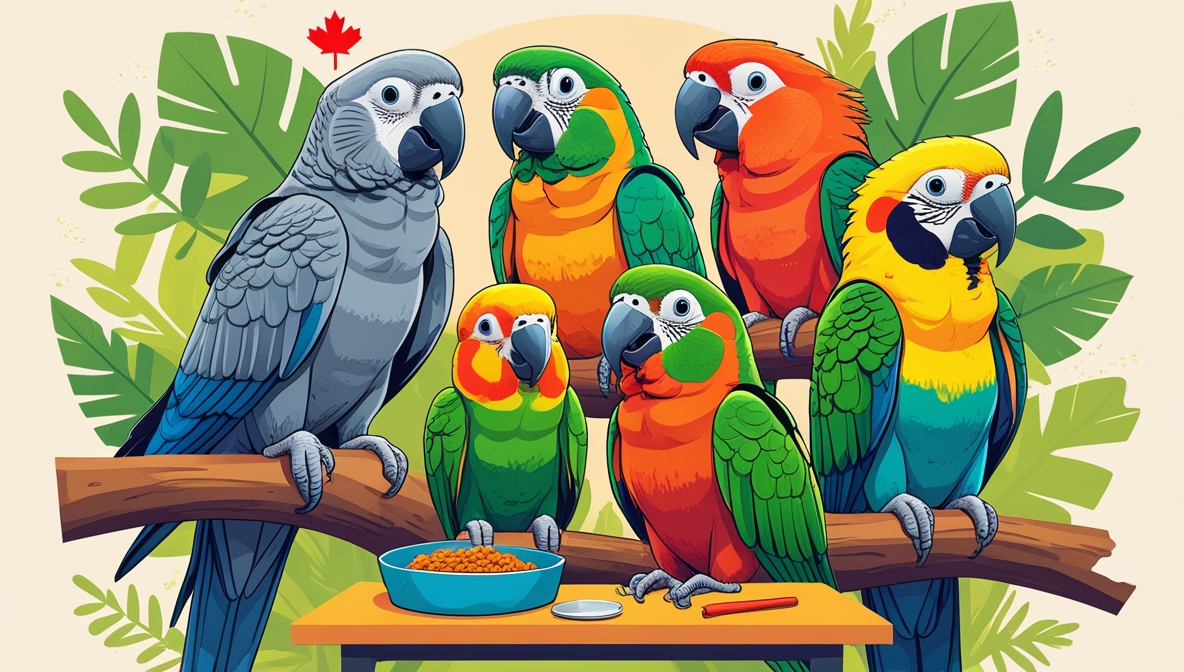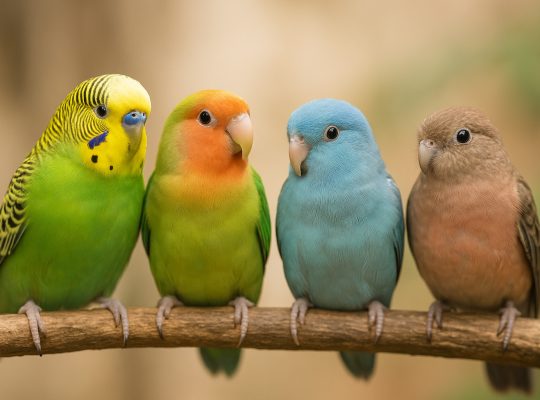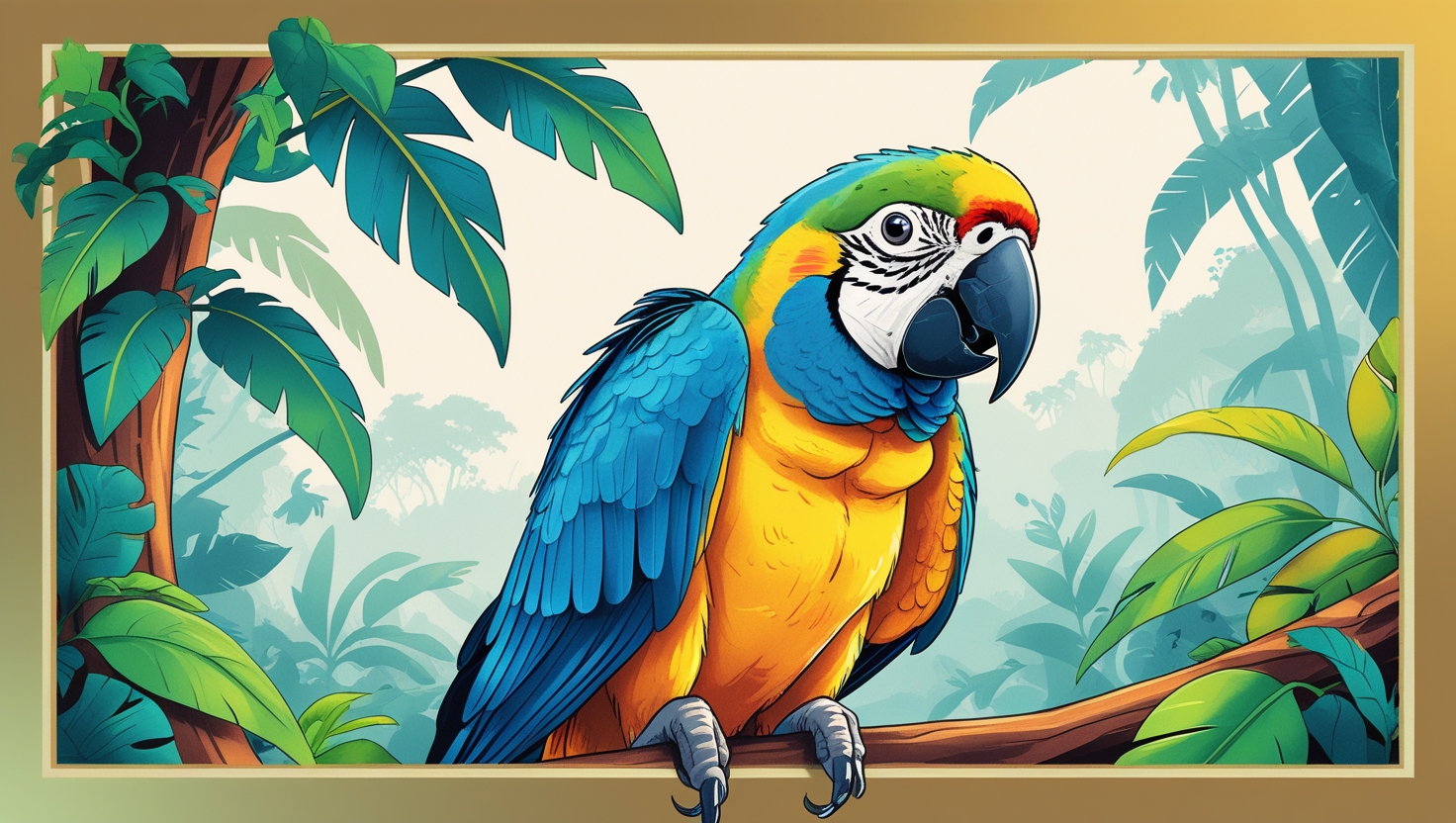Choosing the right parrot requires careful consideration of lifestyle, space, and commitment level. Some parrots demand constant attention, while others thrive independently. Noise level, lifespan, and temperament also vary significantly. Below is a breakdown of popular pet parrots in Canada to help you find the best fit.
1. Budgerigar (Budgie)
Best for: Beginners, families, and apartment dwellers
Lifespan: 5-10 years
Noise Level: Low
Talking Ability: Moderate
Budgies are among the most common pet parrots due to their manageable size, affordability, and cheerful personality. They can mimic words, though their voice is softer compared to larger parrots. They enjoy social interaction but don’t demand constant attention. A spacious cage with toys and daily out-of-cage time keeps them happy.
2. Cockatiel
Best for: First-time parrot owners, families, and those wanting an affectionate bird
Lifespan: 15-25 years
Noise Level: Moderate
Talking Ability: Low to moderate
Cockatiels have endearing personalities and often form strong bonds with their owners. While their speech ability is limited, they excel at mimicking sounds like whistles and alarms. They need daily interaction and mental stimulation. Regular handling helps prevent behavioral issues such as feather plucking.
3. Lovebird
Best for: Those wanting a small, active, and affectionate parrot
Lifespan: 10-15 years
Noise Level: Moderate
Talking Ability: Low
Lovebirds are social and thrive in pairs, though a single bird can bond closely with an attentive owner. Their small size makes them suitable for apartments, but they need enrichment to prevent boredom. While not strong talkers, they communicate through chirps and body language.
4. Conure (Green-Cheeked & Sun Conure)
Best for: Experienced owners, those wanting a playful and interactive companion
Lifespan: 15-30 years
Noise Level: High
Talking Ability: Moderate
Conures are lively and affectionate but require significant interaction. Green-cheeked conures are quieter than sun conures, making them a better choice for those sensitive to noise. Both species enjoy cuddling, playing, and learning tricks. Without regular engagement, they can become loud and destructive.
5. Quaker Parrot (Monk Parakeet)
Best for: Those looking for a talkative and intelligent bird
Lifespan: 20-30 years
Noise Level: High
Talking Ability: High
Quaker parrots are exceptional talkers and form deep bonds with their owners. They enjoy problem-solving activities and need mental challenges to stay engaged. Their strong personalities require consistent training to prevent territorial behavior. Due to their loud nature, they are best suited for households where noise isn’t a concern.
6. Indian Ringneck Parakeet
Best for: Owners with time for training and socialization
Lifespan: 25-35 years
Noise Level: High
Talking Ability: Excellent
Indian Ringnecks are intelligent and known for their clear speech. They require consistent handling to maintain their friendly nature. If neglected, they can become independent and aloof. Their vocalizations are loud, so they may not be ideal for apartment living.
7. Senegal Parrot
Best for: Those wanting a quiet, intelligent, and affectionate bird
Lifespan: 25-30 years
Noise Level: Low to moderate
Talking Ability: Moderate
Senegal parrots are known for their calm demeanor and strong bonds with their owners. While not as loud as other parrots, they still require interaction and mental stimulation. Their playful yet gentle nature makes them a great choice for those wanting a quieter parrot.
8. African Grey Parrot
Best for: Dedicated owners willing to provide lifelong mental stimulation
Lifespan: 40-60 years
Noise Level: High
Talking Ability: Exceptional
African Greys are among the most intelligent parrots, capable of advanced speech and problem-solving. They require significant social interaction, mental challenges, and enrichment to prevent stress-related behaviors. Their intelligence comes with emotional sensitivity, so they need a stable, attentive environment.
9. Amazon Parrot (Blue-Fronted, Yellow-Naped, and Double Yellow-Headed)
Best for: Experienced owners with time for daily interaction
Lifespan: 40-60 years
Noise Level: High
Talking Ability: Excellent
Amazon parrots are energetic, social, and love to vocalize. Their speech clarity and singing ability make them entertaining companions. However, they can develop aggressive tendencies if not properly trained. They need structured routines, positive reinforcement, and plenty of out-of-cage time.
10. Eclectus Parrot
Best for: Owners wanting a quieter, independent bird
Lifespan: 30-50 years
Noise Level: Moderate
Talking Ability: High
Eclectus parrots have striking colors and a calm temperament. They do well in structured environments but can become anxious if neglected. Unlike some parrots that crave constant attention, they prefer scheduled interaction. They require a diet rich in fresh fruits and vegetables for optimal health.
11. Macaw (Mini & Large Species)
Best for: Experienced owners with space and time for a high-maintenance bird
Lifespan: 50-80 years
Noise Level: Very High
Talking Ability: Moderate to high
Macaws are affectionate, intelligent, and incredibly loud. They need ample space for movement, regular training, and a dedicated owner. Mini macaws, such as Hahn’s and Severe Macaws, are slightly quieter and more manageable than their larger relatives. Without proper stimulation, macaws can become destructive.
Choosing the Right Parrot for Your Lifestyle
Best for Beginners
- Budgie
- Cockatiel
- Lovebird
Best for Talkers
- African Grey
- Amazon Parrot
- Quaker Parrot
- Indian Ringneck
Best for Apartment Living
- Budgie
- Cockatiel
- Senegal Parrot
Best for Families
- Cockatiel
- Conure
- Amazon Parrot
Best for Experienced Owners
- African Grey
- Macaw
- Eclectus
Parrots bring joy, companionship, and vibrant energy to a household. Each species has unique needs, so understanding their requirements ensures a fulfilling relationship. Proper training, nutrition, and daily interaction create a happy and well-adjusted pet.


